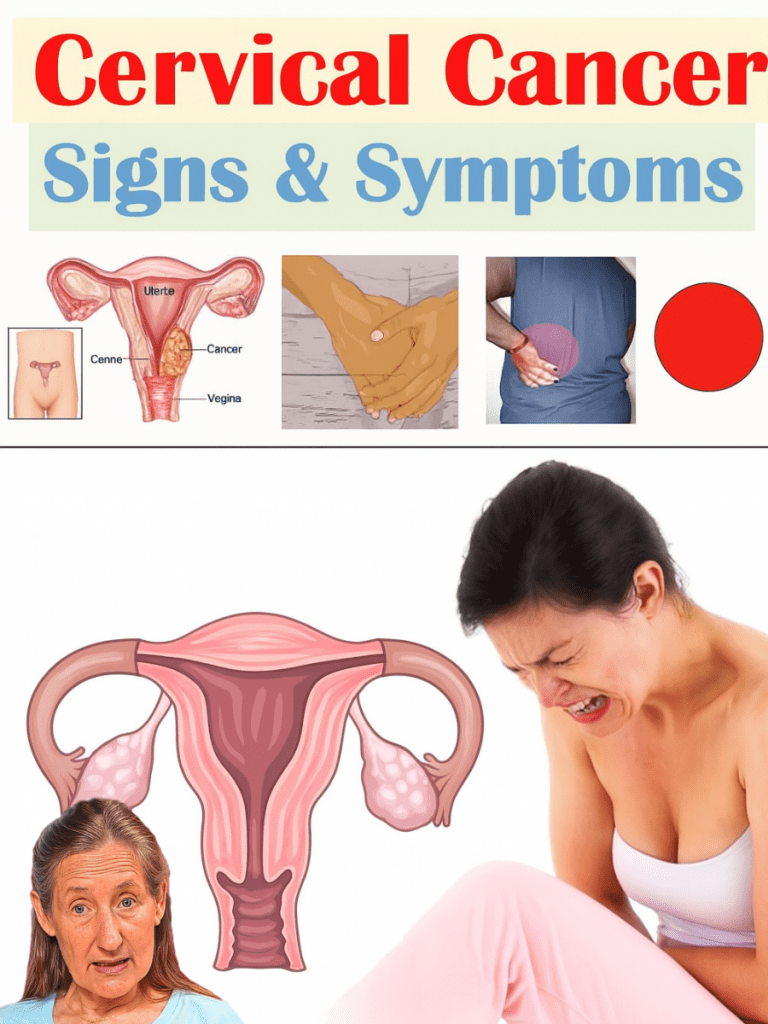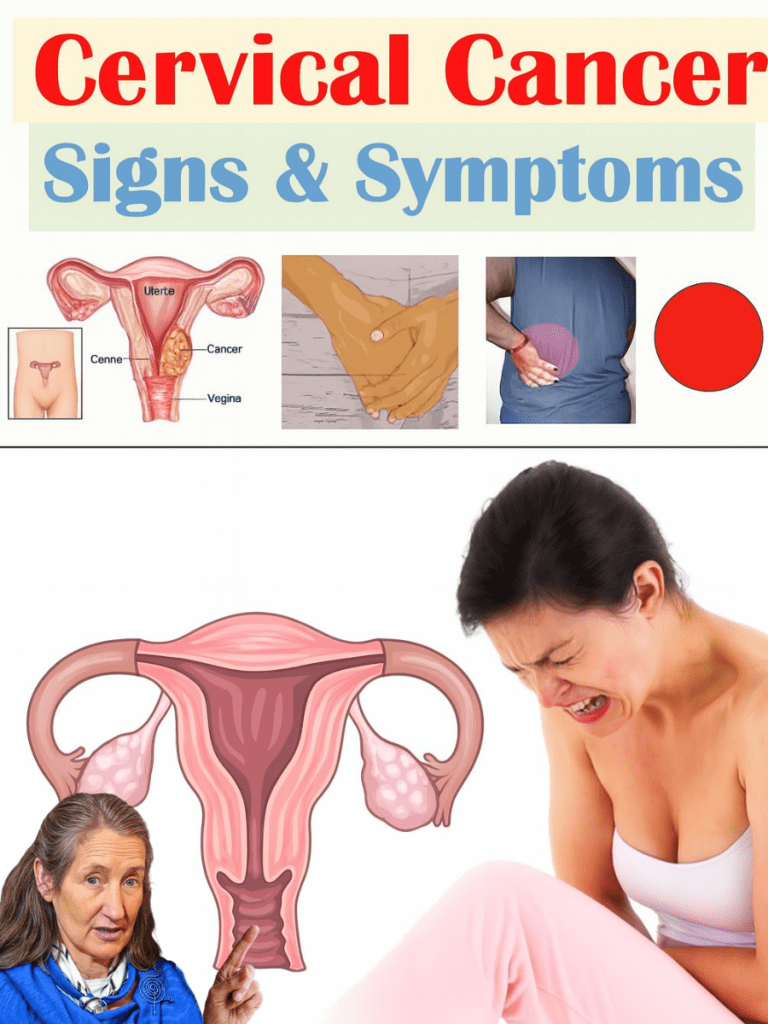Cervical cancer is a stealthy predator, often lurking unnoticed until it’s too late. But what if you could spot its subtle clues before it takes hold? Your body is always whispering—sometimes screaming—signals that something’s wrong. Knowing these early warning signs could mean the difference between life and death. This isn’t just another health article; it’s a wake-up call designed to empower you with knowledge, keep you glued to every word, and inspire you to take charge of your health. Let’s dive into the 10 early signs of cervical cancer, why they happen, and how to act before it’s too late. Buckle up—this could save your life.

🌸 Understanding Cervical Cancer: The Silent Enemy
Cervical cancer begins in the cells lining the cervix, the gateway between the uterus and vagina. It’s a slow, insidious process often triggered by persistent infection with high-risk strains of human papillomavirus (HPV). This virus, common yet dangerous, can cause cellular changes that quietly morph into cancer over years. The scariest part? Early stages often show no symptoms, making awareness your greatest weapon. By catching it early, you drastically improve your chances of successful treatment. Let’s explore the signs your body might be sending and why they matter.
⚠️ 10 Early Warning Signs You Can’t Afford to Ignore
1. Abnormal Vaginal Bleeding: Your Body’s Red Flag
Imagine noticing blood when it’s not your period—or after intimacy, or even years after menopause. Abnormal vaginal bleeding is one of the earliest and most common signs of cervical cancer. As tumors grow, they disrupt delicate blood vessels in the cervix, causing unexpected bleeding. This could manifest as spotting between periods, bleeding after sex, or unexplained bleeding long after menopause. If your cycle suddenly feels unpredictable or you notice blood at unusual times, don’t brush it off. Your body is sounding an alarm—listen to it.
2. Unusual Vaginal Discharge: A Subtle Clue
Your body’s natural discharge is normal, but changes in its color, smell, or texture could spell trouble. Cervical cancer can trigger infection, inflammation, or tissue breakdown, leading to discharge that’s foul-smelling, watery, thick, or tinged with pink or brown. If your discharge feels “off” or looks different than usual, it’s time to take notice. This isn’t just about discomfort—it’s a potential warning sign that your cervix is under attack.
3. Pelvic Pain: A Persistent Warning
A dull ache or sharp stab in your lower abdomen, unrelated to your menstrual cycle, could be more than just a random pain. As cervical tumors grow, they press on surrounding pelvic structures, causing discomfort that lingers or worsens over time. If you’re experiencing persistent pelvic pain that doesn’t align with your period or other known causes, it’s a signal to investigate further. Your body is trying to tell you something—don’t ignore it.
4. Pain During Sex: A Sensitive Sign
Intimacy should bring pleasure, not pain. Yet, cervical cancer can make sex uncomfortable or even unbearable due to inflammation or tumor-related changes in the cervix. You might feel a deep ache during or after intercourse, sometimes accompanied by spotting or bleeding. This symptom, known as dyspareunia, is a red flag that warrants attention. If sex has become painful, it’s time to talk to a doctor—your health deserves it.
5. Longer or Heavier Periods: A Shift in Normal
Your period has its own rhythm, but cervical cancer can throw it off balance. Tumors can disrupt uterine function or hormone signaling, leading to periods that last longer or feel heavier than usual. You might find yourself changing pads or tampons more frequently or noticing that your cycle feels out of control. If your periods are suddenly more intense or prolonged, it’s a sign to take seriously. Your body is waving a flag—pay attention.
6. Painful Urination: A Troubling Symptom
A burning or stinging sensation when you urinate isn’t always just a urinary tract infection. If cervical cancer spreads to the bladder or urinary tract, it can cause irritation or obstruction, leading to painful urination, increased urgency, or even blood in the urine in advanced cases. If you’re experiencing discomfort when you pee, especially alongside other symptoms, it’s time to get checked. Your urinary health could be hinting at something bigger.
7. Lower Back or Leg Pain: A Hidden Warning
Persistent pain in your lower back, thighs, or legs could signal that cervical cancer is progressing. As tumors grow, they may press on nerves or blood vessels in the pelvic area, causing discomfort or even swelling in one or both legs. This symptom often appears in more advanced stages, but catching it early can make a difference. If you’re battling unexplained pain or swelling, don’t dismiss it as “just aging”—it could be a critical clue.
8. Fatigue or Weakness: More Than Just Tiredness
Feeling exhausted even after a full night’s sleep? Chronic fatigue or weakness can be a subtle sign of cervical cancer. Abnormal bleeding can lead to blood loss, while your body’s immune response to cancer saps your energy. You might feel short of breath, dizzy, or simply unable to shake the tiredness. If rest doesn’t recharge you, it’s time to dig deeper. Your energy levels could be signaling a hidden battle within.
9. Unexplained Weight Loss: A Cause for Concern
Losing weight without trying might sound like a dream, but it can be a nightmare when linked to cancer. Cervical cancer can rev up your metabolism, reduce your appetite, or disrupt digestion, leading to rapid, unintentional weight loss. If you’re shedding pounds without changing your diet or exercise habits, it’s a sign to investigate. Your body’s changes could be whispering a serious warning.
10. Constipation or Bowel Changes: A Final Clue
Difficulty passing stool, pain during bowel movements, or sudden changes in your bowel habits could point to cervical cancer. As tumors grow, they can press against the colon or rectum, disrupting normal bowel function. If you’re struggling with constipation or noticing shifts in your bathroom routine, don’t chalk it up to diet alone. This could be your body’s way of signaling trouble in the pelvic region.

👩⚕️ Why These Signs Matter: The Power of Early Detection
Cervical cancer is a master of disguise, often presenting symptoms that mimic less serious conditions. But here’s the truth: early detection can be a game-changer. When caught in its earliest stages, cervical cancer is highly treatable, with survival rates soaring above 90%. Ignoring these signs, however, gives the disease time to spread, making treatment more complex and less effective. If you’re experiencing any combination of these symptoms—especially abnormal bleeding, unusual discharge, or persistent pain—don’t wait. Schedule a visit with your healthcare provider. Your life is worth it.
🛡️ How to Protect Yourself: Prevention Is Your Superpower
Knowledge is power, but action is your shield. Here’s how to take charge of your cervical health and reduce your risk:
Get Screened Regularly
Pap smears and HPV tests are your first line of defense. These simple screenings can detect abnormal cells or HPV infections long before they turn cancerous. Women aged 21–65 should follow their doctor’s screening recommendations, typically every 3–5 years depending on age and risk factors.
Vaccinate Against HPV
The HPV vaccine is a game-changer, protecting against the high-risk strains most likely to cause cervical cancer. It’s recommended for girls and boys starting at age 11 or 12, but adults up to age 45 can still benefit. Talk to your doctor about getting vaccinated—it’s never too late to protect yourself.
Practice Safe Sex
Using condoms and limiting sexual partners can reduce your risk of HPV infection. While condoms don’t offer 100% protection, they significantly lower the odds of contracting high-risk HPV strains.
Quit Smoking
Smoking weakens your immune system, making it harder for your body to fight HPV infections. It also increases the risk of cervical cancer. If you smoke, seek support to quit—your cervix will thank you.
Listen to Your Body
You know your body better than anyone. If something feels off—whether it’s a new symptom or a gut feeling—trust your instincts and seek medical advice. Early action can make all the difference.
💡 The Emotional Impact: Why Awareness Feels Empowering
Discovering you might be at risk for cervical cancer can feel overwhelming, but knowledge is your armor. Each symptom you recognize, each screening you schedule, and each conversation you have with your doctor is a step toward taking control. This isn’t about fear—it’s about empowerment. By understanding the signs and acting on them, you’re not just protecting your health; you’re reclaiming your peace of mind. You’re telling your body, “I’ve got you.”
🌟 A Call to Action: Don’t Wait, Act Now
Your body is always talking—are you listening? Cervical cancer may start quietly, but its early signs are like whispers that grow louder if you pay attention. Don’t let embarrassment, fear, or a busy schedule stop you from getting checked. Make that appointment, ask those questions, and demand answers. You’re not just another patient—you’re a warrior in your own health journey.
Cervical cancer is beatable, especially when caught early. With regular screenings, a proactive mindset, and a commitment to your well-being, you can stay one step ahead of this silent threat. Share this knowledge with the women in your life—your mother, sister, daughter, or friend. Together, we can turn awareness into action and save lives.
Take charge today. Your future self will thank you. 💚









